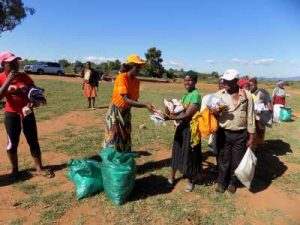
Eliminating Malaria is everyone’s responsibility
World Malaria Day, which takes place on 25 April each year, is an internationally recognized day, highlighting the global efforts to control malaria and celebrating the gains that have been made. The global theme for World Malaria Day, ‘Zero Malaria Starts with Me’, emphasizes everyone’s power and responsibility – no matter where they live – to ensure no one dies from a mosquito bite. DAPP Zimbabwe remains committed to eliminate malaria in Zimbabwe. We reflect on the recently ended Global Funded E8 project on Malaria under the ADPP Mozambique consortium.
The project was aimed to support national cross- border and district community based malaria elimination programs to address the problem of cross-border parasite transportation between the high and low endemic countries through targeting the migrants and mobile populations and the local malaria transmission in underserved hard to reach communities in border districts. The project was premised on four strategic approaches namely
- Community mobilization and empowerment with advocacy, Information Education and Communication (IEC) for demand creation and utilization
- Early diagnosis and testing with Rapid Test Kits and quality control with Microscopy
- Treatment, referral, follow up and radical cure with combination malaria drugs
- Surveillance and tracking of cases with monitoring and evaluation
The project main results were:
- Construction of 5 Border Health Posts to serve the population around border areas and Migrant and Mobile Populations in Beitbridge, Rushinga, Mutasa, Mudzi and Chiredzi.
- Health Posts successfully offered Malaria treatment including some Primary Health Care services as agreed by the District Health Executives (DHEs).
- Enhanced Malaria Participatory approaches with campaigns and cooperation with all locally recognized structures.
- EHTs managed to carry out Case investigations and identification of breeding sites in pursuant to control of malaria.
- Registered General Nurses (RGNs), Environmental Health Technicians (EHTs) and the Project staff combined in advancing Social behaviour change communication within the far to reach communities on Malaria awareness.
- Strengthening communities on local collaboration through Community Advocacy meetings which engaged local leadership and cross border communities.
- Enhanced community testing and treatment of malaria by VHWs.
- Mobilization for Indoor Residual Spraying (IRS) Programs at Household level & Feedback meetings with Village Health Workers.
- Each Health Post managed to form a Health Centre Committee to spearhead local development of the health post.



